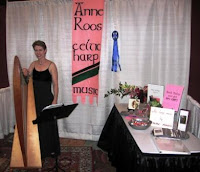The following was originally posted by
Caroline Dowd-Higgins from her blog
"This is Not the Career I Ordered" on August 2, 2010
Finding it hard to sit still at a desk job,
Anne Roos had many occupations over the years before she found her dream career. She was a high school teacher in northern California but didn’t feel supported by the administration and soon burned out because it was not a good fit. All along she had been pursuing her passion on the weekends as a harpist for weddings, concerts and special events. But could she actually make money as a full-time musician?
Turning and Avocation into a Vocation
Anne knew she needed a change from the monotonous filler jobs that were not honoring her passions or her values. She longed for a career that stimulated her intellectually, artistically, and financially, so she took the plunge and decided to make playing the harp her livelihood and not her avocation.
In college, Anne studied music theory and received her formal music education at the University of California, Los Angeles (UCLA). When the Celtic harp piqued her interests, she studied harp techniques from world-renowned harpist Sylvia Woods and contributed to her book Music Theory & Arranging Techniques for Folk Harps. Anne also studied professional stage performance with Ed Hooks (San Francisco, CA) and at the Living History Centre (Novato, CA). Fully trained as a professional musician, Anne didn’t pursue the Celtic harp as a career option right out of university but is now enjoying the opportunities to perform, market, and promote herself as a freelance musician.
From the Wedding March to Frank Sinatra
Her performance career started with Renaissance fairs, and she quickly became a favored soloist for many other types of events. Anne is especially popular for weddings and corporate events. Her concert performances attract international acclaim—Anne’s music has been featured on United Airlines in-flight Music Service. Her music repertoire spans traditional Celtic (Irish, Scottish, Welsh), English, folk, religious and secular, Early, Renaissance and classical music, to Broadway, contemporary modern, popular movie music, Beatles, rock and jazz, and her range is virtually unlimited.
Anne can easily provide the traditional “Canon in D” and “Here Comes the Bride” for a wedding processional, but can also play classic Frank Sinatra or Metallica at a reception. Her ability to faithfully play this broad range of musical styles has made here a popular and much sought after musician for all types of events.
Anne also has a number of
CDs available on the market. Her recordings are unique—Her recent releases are actually little books with CDs tucked neatly into the back page. This way, instead of simply buying downloads, her customers have the option of buying souvenir of Anne’s performance that has added value as a gift item.
Risky Business
So why didn’t Anne start out her career as musician and bypass teaching and all the other jobs? At that point in her life, being a musician seemed too risky and not a practical way to earn a living. But over the years, Anne developed a true sense of what she really values on the job and all things kept pointing back towards what she really loved – the Celtic harp.
She now appreciates the opportunity to make her own decisions. She chooses her own bosses in the form of clients for whom she performs. When she made the commitment to give the harp a go seriously, she kept a part-time job at a book store until her scheduled gigs became a full-time endeavor. These baby steps allowed her to pursue guerilla marketing to get the word out about her offerings and made the transition financially feasible.
Since Anne is her own agent, publicist, and marketing specialist, she has become an expert at building professional relationships. Much of her work comes from referrals so it is imperative that she make each client happy, especially the brides, in order to keep the business moving forward. Brides talk to each other so this network has become very valuable in building her business.
Keeping the Brides Happy
Anne is also a published author and considered a wedding music specialist with her book
“The Musician’s Guide to Brides”, published by
Hal Leonard books as a how-to manual for musicians who are interested in performing at weddings. She also wrote an upcoming book, through the same publisher. It’s for brides and is called
“The Bride’s Guide to Musicians: Live Wedding Music Made Easy and Affordable”, due on the market in December of 2010.
Anne counsels and mentors musicians and entrepreneurs to help them make a living by gigging and provides amazing information and resources on her blog: What’s Up With That Gig? This is a wonderful way for Anne to pay-it-forward to others who are paving their way as a professional musician. She covers topics like writing a press release, marketing tactics for musicians and tapping into your business intuition.
Anne also hired a virtual personal assistant to do much of the administrative work for the business so she can focus on making music and meeting with new clients. The human touch is what distinguishes Anne’s business. She takes pride in meeting with prospective clients in person to get to know them and design music for their event in a more personal and customized way.
While business has steadily increased, Anne remembers the early days when she would take any job she could get because she needed the money. She later developed a 6th sense, an intuition of sorts, about which clients she would enjoy working with, ensuring that they would derive maximum benefit from her performance.
Anne really appreciates being her own boss and being able to take time off when she needs it. She has also learned to hire others who do what she cannot to make her business more successful. Her website is her best marketing tool and includes audio and video examples of her work plus an online store where clients can buy her books and many recordings.
A Tweeting Harpist
The rise of social media has helped Anne connect with clients on
Twitter,
Facebook, blogs, and elsewhere on the ‘net. She is a Celtic harpist with an online presence and finds these resources incredibly beneficial to continue to build her brand and client base.
While classroom teaching was not a good fit in a previous life, Anne now enjoys working with students presenting a number of educational demonstrations for school assemblies annually. She presents workshops and teaches private lessons when her busy performance schedule permits. Anne enjoys teaching students one-on-one, and even does so utilizing computer teleconferencing software, such as Skype. Her public performances include appearances in venues both small and grand: from book stores, private clubs, and café concert venues to resort hotels, cruise ships, Highland Games, Celtic and Renaissance fairs, wineries, meditation retreats, and convention centers. She has accepted invitations to perform for many dignitaries at home and abroad, including, the Lord Mayor of Dublin, Ireland!
Join the Club
Anne told me that she will know she has made it when she can book a private plane to take her and her harp to play gigs wherever she wants around the world! But seriously, she always welcomes new opportunities. At present, Anne is located in the Lake Tahoe region but she aspires to grown her business to take on more international performance opportunities.
For now, this Celtic harpist is very happy playing to her strengths and living her passion. While most musicians transition the other way from a musical career to something else, Anne has taken her musical role to new heights and is thriving with a multi faceted career that includes performance, consulting, teaching and advising other musicians. She even formed a
Celtic Harp Club for fans who can follow her travels and receive a free download of her music.
Anne’s Advice and Action Steps:
Hire professionals to do what you can’t. It will save you time and money in the long run.
Seek out resources and support from trusted referrals.
Don’t quit your day job. When transitioning into a new career as an entrepreneur, retain and income until you know it’s time to move on.
Quote: “Take baby steps to realize your dream. It will happen but be patient and always ready.”

































